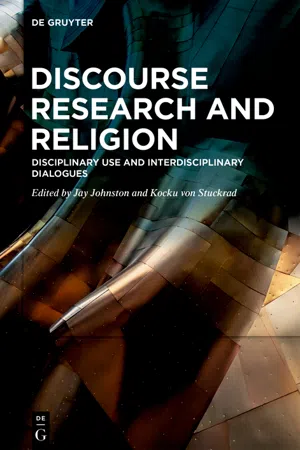
Discourse Research and Religion
Disciplinary Use and Interdisciplinary Dialogues
- 258 pages
- English
- ePUB (mobile friendly)
- Available on iOS & Android
Discourse Research and Religion
Disciplinary Use and Interdisciplinary Dialogues
About this book
The discursive study of religion is a growing field that attracts increasing numbers of students and researchers from a wide variety of disciplinary backgrounds. This volume is the first systematic presentation of the research into religion and discourse. Written by experts from various disciplines, each chapter offers an integrative overview of theory, method, and contextual studies by focusing on a specific approach, interdisciplinary relationship, controversy, or theme in the field. Taking the discursive dimension in the production of knowledge seriously, the book also provides a critical analysis of academic practice and explores new forms of scholarly communication, including open peer-review. The collected volume will appeal to scholars and postgraduate students across a variety of disciplines, including religious studies, history of religion, sociology of religion, discourse studies, cultural studies, and area studies.
Frequently asked questions
- Essential is ideal for learners and professionals who enjoy exploring a wide range of subjects. Access the Essential Library with 800,000+ trusted titles and best-sellers across business, personal growth, and the humanities. Includes unlimited reading time and Standard Read Aloud voice.
- Complete: Perfect for advanced learners and researchers needing full, unrestricted access. Unlock 1.4M+ books across hundreds of subjects, including academic and specialized titles. The Complete Plan also includes advanced features like Premium Read Aloud and Research Assistant.
Please note we cannot support devices running on iOS 13 and Android 7 or earlier. Learn more about using the app.
Information
Entering Discourses: A New Agenda for Qualitative Research and the Sociology of Knowledge
1 Introduction
2 Entering Discourses
[r]ecent commentators have begun to recognize not only the real breaks and paradigm-shifts, but also some of the affinities and continuities, between older and newer traditions of work: for example between Weber’s classical interpretive “sociology of meaning” and Foucault’s emphasis of the role of the “discursive.”(Hall 1997b, 224)
[a]ll this, however, does not mean that the decision of the scientist in stating the problem is an arbitrary one or that he has the same “freedom of discretion” in choosing and solving his problems which the phantasying self has in filling out its anticipations. This is by no means the case. Of course, the theoretical thinker may choose at his discretion [a particular scientific field.] But, as soon as he has made up his mind in this respect, the scientist enters a preconstituted world of scientific contemplation handed down to him by the historical tradition of his science. Henceforth, he will participate in a universe of discourse embracing the results obtained by others, methods worked out by others. This theoretical universe of the special science is itself a finite province of meaning, having its peculiar cognitive style with peculiar implications and horizons to be explicated. The regulative principle of constitution of such a province of meaning, called a special branch of science, can be formulated as follows: Any problem emerging within the scientific field has to partake of the universal style of this field and has to be compatible with the preconstituted problems and their solution by either accepting or refuting them. Thus, the latitude for the discretion of the scientist in stating the problem is in fact a very small one.(Schütz 1973, 250)
- a dynamic process of competition among the members of a very large ‘population’ of social problem claims;
- the institutional arenas that serve as ‘environments’ where social problems compete for attention and grow;
- the ‘carrying capacities’ of these arenas, which limit the number of problems that can gain widespread attention at one time;
- the ‘principles of selection’ or institutional, political, and cultural factors that influence the probability of survival of competing problem formulations;
- patterns of interaction among the different arenas, such as feedback and synergy, through which activities in each arena spread throughout the others; and
- the networks of operatives who promote and attempt to control particular problems and whose channels of communication crisscross the different arenas. (Hilgartner and Bosk 1988, 56)
Table of contents
- Title Page
- Copyright
- Contents
- Introduction
- Discourse Analysis as an Anthropology of the Mundane: An Interview
- Entering Discourses: A New Agenda for Qualitative Research and the Sociology of Knowledge
- Religious Discourse and Its Modules
- Historical Discourse Analysis: The Entanglement of Past and Present
- Whose Voice Is This? The Multicultural Drama from CDA and DST Perspectives
- Some Important Conceptual Lines of Discourse Theories in Cultural Studies of Religion
- The Power Politics of ‘Religion’: Discursive Analysis of Religion in Political Science and International Relations
- Religion, Discourse, and the Economy Question: Fraught Issues in Market Societies
- Dynamics of the Human Rights Discourse on Freedom of Religion – Observed from the Religious Studies Angle
- Gender and Its Vicissitudes
- ‘Beyond’ Language? Ecology, Ontology, and Aesthetics
- Index of Key Terms
- Index of Places
- Index of People